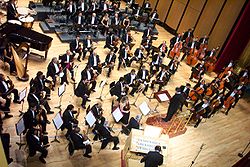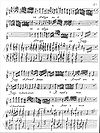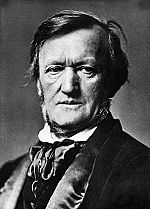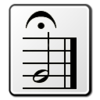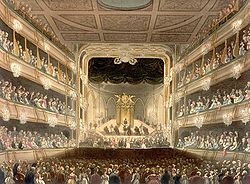- Portal:Classical music
-
- Wikipedia portals:
- Culture
- Geography
- Health
- History
- Mathematics
- Natural sciences
- People
- Philosophy
- Religion
- Society
- Technology
Classical music is a broad term that designates the art music of Western cultures. The works performed by classical musicians are selected from a tradition of written music dating back to the Middle Ages. Much of this music was originally composed as church music or for the entertainment of the aristocracy. Starting about the mid 18th century, classical music began to be composed for a public of classical music listeners, and it is this audience that continues to support the tradition today. Classical music is commonly divided into historical eras, including Medieval, Renaissance, Baroque, Classical, Romantic, and Modern. Culturally, classical music stands out for the intensive training that serious participants must undergo, as well as the tendency of its listeners to cherish, even venerate, particular works and their composers.Selected article
The concerto delle donne (lit. consort of ladies) was a group of professional female singers in the late Renaissance court of Ferrara, Italy, renowned for their technical and artistic virtuosity. The ensemble was founded by Alfonso II, Duke of Ferrara, in 1580 and was active until the court was dissolved in 1597. Giacomo Vincenti, a music publisher, praised the women as "virtuose giovani" (young virtuosas), echoing the sentiments of contemporaneous diarists and commentators. The origins of the ensemble lay in an amateur group of high-placed courtiers who performed for each other within the context of the Duke's informal musica secreta in the 1570s.Selected biography
Wilhelm Richard Wagner (English pronunciation: /ˈrɪtʃ.ərd ˈvɑɡ.nər/, German pronunciation: [ˈʁi.çaʁt ˈvaɡ.nɐ]; 22 May 1813, Leipzig, Germany – 13 February 1883, Venice, Italy) was a German composer, conductor, theatre director and essayist, primarily known for his operas (or "music dramas", as they were later called). Unlike most other great opera composers, Wagner wrote both the scenario and libretto for his works.
Richard Wagner was born at no. 3 ('The House of the Red and White Lions'), the Brühl, in Leipzig on 22 May 1813, the ninth child of Carl Friedrich Wagner, who was a clerk in the Leipzig police service. Wagner's father died of typhus six months after Richard's birth, following which Wagner's mother, Johanna Rosine Wagner, began living with the actor and playwright Ludwig Geyer, who had been a friend of Richard's father. In August 1814 Johanna Rosine married Geyer, and moved with her family to his residence in Dresden. For the first 14 years of his life, Wagner was known as Wilhelm Richard Geyer. Wagner may later have suspected that Geyer was in fact his biological father, and furthermore speculated incorrectly that Geyer was Jewish.
Geyer's love of the theatre was shared by his stepson, and Wagner took part in his performances. In his autobiography, Wagner recalled once playing the part of an angel. The boy Wagner was also hugely impressed by the Gothic elements of Weber's Der Freischütz. In late 1820, Wagner was enrolled at Pastor Wetzel's school at Possendorf, near Dresden, where he received some piano instruction from his Latin teacher. He could not manage a proper scale but preferred playing theatre overtures by ear. Geyer died in 1821, when Richard was eight. Consequently, Wagner was sent to the Kreuz Grammar School in Dresden, paid for by Geyer's brother. The young Wagner entertained ambitions as a playwright, his first creative effort (listed as 'WWV 1') being a tragedy, Leubald begun at school in 1826, which was strongly influenced by Shakespeare and Goethe. Wagner was determined to set it to music; he persuaded his family to allow him music lessons.
Archive • Read More...Quotes
“ Music is, by its very nature, essentially powerless to express anything at all. ” “ Emphasis on the common emotive or affective origins of music and words in the first cries of humankind undermines words. ” —Jean Philippe Rameau
“ Music is the wine which inspires one to new generative processes, and I am Bacchus who presses out this glorious wine for mankind and makes them spiritually drunken. ” “ I give bird songs to those who dwell in cities and have never heard them, make rhythms for those who know only military marches or jazz, and paint colors for those who see none. ” “ Music is enough for a life — but a life is too short for music. ” “ Music conveys a prophetic message, revealing a higher form of life towards which mankind evolves. ” ArchiveCategories
- Category:Classical music
- Category:Classical musicians
- Category:Conductors
- Category:Orchestras
- Category:Classical compositions
- Category:Concert halls
- Category:Classical music by nationality
- Category:Classical music lists
- Category:History of European art music
Things you can do
Selected sound
The Well-Tempered Clavier (Das Wohltemperirte Clavier in the original old German spelling), BWV 846–893, is a collection of solo keyboard music composed by Johann Sebastian Bach. He first gave the title to a book of preludes and fugues in all 24 major and minor keys, dated 1722, composed "for the profit and use of musical youth desirous of learning, and especially for the pastime of those already skilled in this study."
Archive • Read More...Topics
- Major periods:
- Early:
- Medieval (500 – 1400)
- Renaissance (1400 – 1600)
- Common practice:
- Modern and contemporary:
- 20th century classical (1900 – 2000)
- Contemporary classical (1975 – present)
- Early:
- Notable composers:
- Johannes Ockeghem
- Giovanni Pierluigi da Palestrina
- Claudio Monteverdi
- Johann Sebastian Bach
- George Frideric Handel
- Antonio Vivaldi
- Wolfgang Amadeus Mozart
- Joseph Haydn
- Ludwig van Beethoven
- Franz Schubert
- Frederic Chopin
- Peter Tchaikovsky
- Johannes Brahms
- Antonin Dvorak
- Richard Wagner
- Claude Debussy
- Edward Elgar
- Gustav Mahler
- Arnold Schoenberg
- Dmitri Shostakovich
- Igor Stravinsky
- Benjamin Britten
- Music theory
Selected picture
The Royal Opera House is an opera house and major performing arts venue in the London district of Covent Garden. The large building, often referred to as simply "Covent Garden", is the home of The Royal Opera, The Royal Ballet and the Orchestra of the Royal Opera House.Archive • Read More...In the news
- May 31, 2009: The 200th anniversary of Joseph Haydn's death is commemorated.
- April 14, 2009: The 250th anniversary of George Frederic Handel's death is commemorated.
- February 3, 2009: The bicentennial of nineteenth-century composer Felix Mendelssohn is celebrated.
- February 22-March 1, 2010: The bicentennial of nineteenth-century composer Frederic Chopin is celebrated with events in Poland going on between his two possible birthdays.
Did you know...
... that Johann Sebastian Bach is only one of 53 "musical Bachs" in several generations?
... that the longest non-repetitive piano piece is The Road, composed by Frederic Rzewski, and it lasts about 10 hours?
... that Gioacchino Rossini wrote his comic opera The Italian Girl in Algiers in less than three weeks?
... that the piece 4'33" by John Cage is made up entirely of silence from the performer?
... that Stockhausen's Helikopter-Streichquartett is played by a string quartet and four helicopters?
Classical music Classical guitar Opera WikiProject Classical music WikiProject Composers WikiProject Contemporary music WikiProject Opera WikiProject Richard Wagner WikiProject Gilbert and Sullivan Associated Wikimedia
Other portals
Categories:- WikiProject Classical music
- Music portals
- Classical music
- Music
Wikimedia Foundation. 2010.

